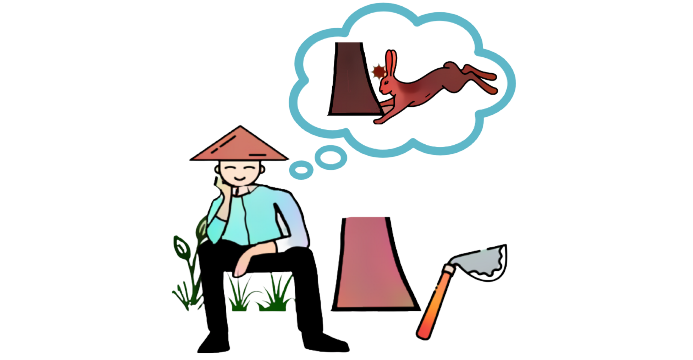Read paragraph 1.
"In ancient China, there was a young farmer whose family had made a living out of farming for many generations. Farmers used to sow in spring and harvest in autumn, and began to work at sunrise and finished at sunset. In good harvest years, they could have enough food to eat and enough clothing to wear. However, when there was a famine due to crop failure, they had to suffer from hunger."
Read paragraph 1.
"However, when there was a famine due to crop failure, they had to suffer from hunger."
Read paragraph 2.
"The young farmer grabbed the hare and noticed that its eyes were severely infected. He said happily to himself, 'Poor blind hare, I got you with no effort!' "
Read paragraph 2.
"One day, a big fat hare jumped out of the grass while the young farmer was working in the fields. It ran past him in a panic and accidently bumped into a tree stump. Its neck was seriously broken and it was finally dead."
Read paragraph 3.
"After the hunters left the place, the farmer took the hare home excitedly and cooked a delicious meal for himself."
Read paragraph 4.
"That night the farmer thought, 'My luck comes at last! I need not work hard now. All I have to do is wait every day by the stump to pick up the hare that runs into it. How wonderful it will be!' "
Read the sentences carefully to understand their meanings.
Read paragraph 5.
"When he looked at the fields, he could not believe his eyes because all his fields were overgrown with weeds."
Read paragraph 4.
"Becoming too lazy to work hard to change his life, the farmer relied on his luck from then on. He abandoned his fields, put away all his farming tools, stayed by the tree stump and wished to get other hares."
Waiting for More Hares to Dash Dead against the Stump
Score Sheet
| Questions | Results |
|---|---|
| Question 1 | |
| Question 2 | |
| Question 3 | |
| Question 4 | |
| Question 5 | |
| Question 6 | |
| Question 7a | |
| Question 7b | |
| Question 7c | |
| Question 7d | |
| Question 8 | |
| Question 9 | |
| Total |
10. What is the moral lesson of the story? Based on the story, which Chinese saying can you think of?
11. Miracles do not happen every day. To achieve our goals, we should work very hard. Do you have any goals? What will you do to achieve them? Share them with your parents or classmates.
Extension Activity
Watch the video clip "How Smart Farming Brings Social Good", which is about the application of modern technology in China such as cloud computing and driverless vehicles to grow and harvest crops more sustainably.
Acknowledgements: The China Current
https://chinacurrent.com/story/23773/how-smart-farming-brings-social-good
In the past, farmers worked very hard, but it did not guarantee good harvests. Thanks to modern technology, the work of farming has changed a lot, e.g. less physical labour and high yields during the harvest. What impresses you most in smart farming? Think and share your ideas or experiences with your parents or classmates.
